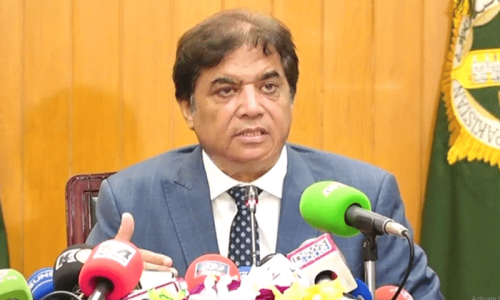LAHORE: A new set of data estimates that 231,400 stillbirths and 202,400 neonatal deaths take place every year in Pakistan, which means that 1,188 babies die during childbirth daily, largely because of preventable diseases.
The disturbing data is part of a research study, the Lancet Every Newborn Series, released jointly last week by the World Health Organisation and Unicef. The research aims to provide information that will affect policy globally.
The research work was led by Professor Joy Lawn of the London School of Hygiene and Tropical Medicine and Professor Zulfiqar Bhutta of the Centre of Excellence in Women and Child Health, Aga Khan University (AKU), Pakistan, in collaboration with over 54 experts from 28 institutions in 17 countries.
The AKU was also represented by Dr Jai K. Das, Rehana A. Salam and Arjumand Rizvi. Save the Children, the Centre for Global Child Health and the Hospital for Sick Children, Canada, also contributed to the research.
According to the study, an estimated 289,000 women die across the world as a result of complications in pregnancy and childbirth every year. Nearly three million babies do not survive their first month of life and 6.6m do not live to see their fifth birthday. As many as 2.6m are stillborn.
More than 75 per cent of the newborn deaths occur in South Asia and sub-Saharan Africa.
The study presents a gloomy picture for Pakistan, showing that the country has failed in reducing neonatal and maternal mortality ratios as per the goal set by the international health partners, including the WHO and Unicef.
“In Pakistan, the rate of neonatal deaths has not changed for almost three decades. But with the required focus on integrating community-based approaches to newborn care through the lady health workers programme and improved linkages and transfer to district referral facilities, we have the potential in a decade to save 158,000 newborn lives and prevent 80 per cent of annual newborn deaths,” the study says.
It lists Pakistan among eight high-burden countries — including Afghanistan, Bangladesh, Democratic Republic of the Congo, India, Kenya, Nigeria and Uganda — and has set targets for post-2015 period to ensure that every newborn has a healthy beginning in life.
“A systematic assessment of challenges in the eight countries which together account for more than half of all newborn and maternal deaths revealed important differences as well as several common bottlenecks impeding progress,” it says.
A team of global health experts, led by Dr Kim Dickson of Unicef, after consultation with more than 600 health professionals and policymakers found that common problems were related to health workforce, financing and service delivery.
“The greatest opportunity exists in improving the quality of care in Pakistan. If every woman delivering a baby in a facility receives recommended care, two million lives could be saved by 2020. Our analysis suggests that India, Nigeria and Pakistan would benefit the most in terms of absolute lives saved, and the top five countries would account for 57 per cent of the total reduction in global mortality,” Dr Jai Das says in the report.
An analysis by Dr Bhutta says that preventable deaths could be dramatically reduced through proven interventions like breastfeeding, neonatal resuscitation, kangaroo mother care for preterm babies and antenatal corticosteroids.
If the interventions are effectively implemented, Pakistan can prevent 217,700 maternal and newborn deaths every year by 2025.
The situation indicates fatalism around newborn deaths and stillbirths though most of the deaths are preventable. Preterm births, intrapartum complications and infections are the leading causes of neonatal deaths.
The research sets some key neonatal strategies, particularly for the high-burden countries, for post-2015 period to ensure that they are committed to reducing national neonatal mortality rates to fewer than ten deaths per 1,000 births by 2035.
Published in Dawn, May 26th, 2014














































